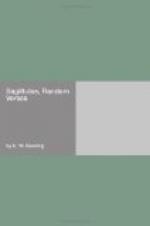’He falls’—the
Placets thundered,
And filled the yawning gap;
In vain his trusty comrades
Avenge their chief’s
mishap—
His
last great fight is done.
’They charge! Brave Pottius
prostrate lies,
No Rider helps him to arise:
They charge! Fierce Mariensis dies.
The
Bridge, the Bridge is won!
XVII.
In vain did Bencornutus
Flash lightnings from his
beard;
In vain Fabrorum Maximus
His massive form upreared;
And Lumbius Revisorius—
Diviner potent he!—
And Peronatus robed in state,
And fine old Fossilis sedate,
All vainly stemmed the tide of fate—
Triumphed
the Graces Three!
XVIII.
But when in future ages
Women have won their rights,
And sweet girl-undergraduates
Read through the lamp-lit
nights;
When some, now unborn, Pollia
Her head with science crams;
When the girls make Greek Iambics,
And the boys black-currant
jams;
XIX.
When the goodman’s shuttle merrily
Goes flashing through the
loom,
And the good wife reads her Plato
In her own sequestered room;
With weeping and with laughter
Still shall the tale be told,
How pretty Pollia won the Bridge
In the brave days of old.
(1881).
[1] The ancient name of Hitchin.
Julia.
An Ode.
[Note.—The following imitation of Cowper’s Boadicea was written in 1858; most of its predictions have since been fulfilled.]
When the Cambridge flower-show ended,
And the flowers and guests
were gone,
And the evening shades descended,
Roamed a man forlorn alone.
Sage beside the River slow
Sat the Don renowned for lore
And in accents soft and low
To the elms his love did pour.
“Julia, if my learned eyes
Gaze upon thy matchless face:
’Tis because I feel there lies
Magic in thy lovely grace.
“I will marry! write that threat
In the ink I daily waste:
Marry—pay each College debt—
College Ale no more will taste.
“Granta, far and wide renowned,
Frowns upon the married state;
Soon her pride shall kiss the ground
Hark! Reform is at the
gate.
“Other Fellows shall arise,
Proud to own a husband’s
name:
Proud to own their infants’ cries—
Harmony the path to fame.
“Then the progeny that springs
From our ancient College walls,
Armed with trumpets, noisy things,
Shall astound us by their
squalls.
“Sounds no wrangler yet has heard,
Our posterity shall fright:
E’en ‘the Eagle,’ [1]
valiant bird,
Shall betake itself to flight.”
Such the thoughts that through him whirl’d
Pensively reclining there:
Smiling, as his fingers curled
His divinely-glowing hair.




